Key Grant Management Roles
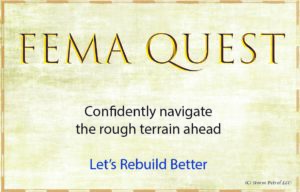
Building your disaster relief grant management team requires identifying people to fill roles. We are building a Cast of Characters for our FEMA Quest Game as a means of helping you identify Good-Guys. There are key grant management roles that we suggest you fill. Stay tuned to learn the value of Wizards and Millers. While we can show you how to manage disaster relief grants, you and your team must do the work.
We are providing these materials to you hoping that you can help your community, your organization survive this disaster and wisely execute the mission before you. If you appreciate this presentation, please share it.
Subscribe to our YouTube Channel
Good Guy Guide
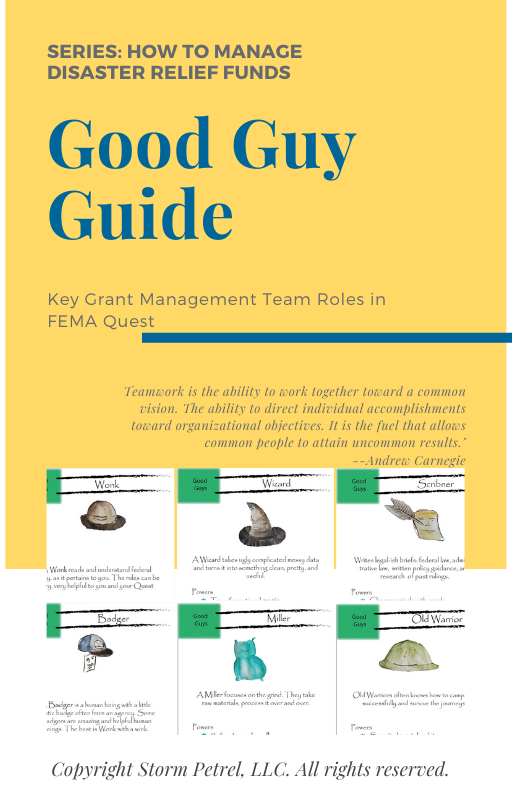
We’ve invented this fictious game called FEMA Quest. This series will help you confidentially navigate the rough terrain ahead. There are people you have met or will meet along the way. Some are Good Guys. Some of the Good Guys you’ll want as members of your team. And in the next episode, we’ll take a humorous and sincere look at the Bad Guys in this cast of characters.
A couple of these people you want to identify and recruit right away especially the Wizard and the Miller. Finding a Wonk is helpful too. You’re going to want to identify a good Badger and make friends there. Having access to a Scribner is good as well.
These people will hold key grant management roles.
Finding a Wizard
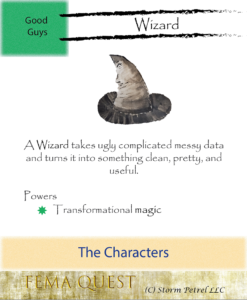
Let’s go find a Wizard and a Miller!
You may already know a Wizard – one of these people who while at a computer find pile of data and can turn that mess into something incredibly useful. One of your early challenges is aggregating all of your payroll data. FEMA wants to see this pile, but the numbers you see – the amounts on the paychecks are not the values FEMA pays. FEMA pays you their hourly rate, plus all of their benefits, uniforms, and such. There is no real abracadabra here. It is work, but the work done by a Wizard seems efficient and effortless. It looks like magic.
What’s amazing about Wizards is that they are often unsung, and do exactly what is needed even if your question isn’t precisely correct.
If you think you have found a Wizard show the entire challenge to them. Not just the tiny piece. Show them the FEMA Quest game. “Hey, do you have any idea how I get the payroll data out of this computer system and turn it into something useful for FEMA that uses their fringe or billing rates.” Show them, let them explore the question.
A Wizard may not be where you expect them. You clearly need payroll data. But the Wizard may not be on that payroll or accounting team. Wizards face challenges as a game. They tend to find ways of saying: I think I can make that happen. A little hesitancy, a soupcon of optimism, and odd sense that they are thinking faster than you are talking.
Finding a Miller
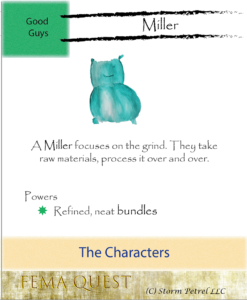
The Miller is another amazing member of your grant management team. Find one, or two, or three. The Miller puts a nose close to the grindstone and works. Take from the pile on the left, grind through it, refine it, process it, and wrap it into a nice neat package. The Miller and the mill work together to gradually and steadily convert raw data and raw documents into something that is a cohesive, value-added product that give credibility and proof to your progress around the gameboard.
Treat your Wizards and Millers well. Give them the right tools. Provide the environment they need. Two screens? Three screens? Give it. A high-speed scanner at their right elbow instead of the left, make it happen. There are people in your world who are not Wizards and Millers. They are good people too.
At Storm Petrel, we know when an organization has a Miller. Our software Tempest-GEMS has reports that shows productivity. The leaderboard shows counts the amount of data entered by person, by week. It also counts the number of documents uploaded by person, by week. The Millers stand together at the top of this report.
In Episode 7, we will continue to explore the cast of characters. We’ll provide you means of identifying the bad guys along the route. We’ll create an identification guide.
Finding a Wonk
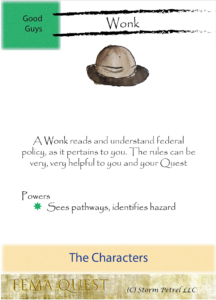
A Wonk is a helpful ally too. Sometimes these people are consultants you’ve hired. Maybe this is a colleague from another organization or region who has been through several hurricanes. A Wonk reads and understand federal policy, as it pertains to you. The rules can be very, very helpful to you and your Quest. Knowing them, knowing how to apply them, and even knowing how FEMA has applied them in the past is highly valuable.
Wonk see pathways and solutions in the rules, the policy guides, in the confusing email coming from the various sources. They can see the rules as benefits and risks. Some of my favorite wonk are former lawyers or people who get whacked by a disaster after years of encounters with other federal policies.
The Badger
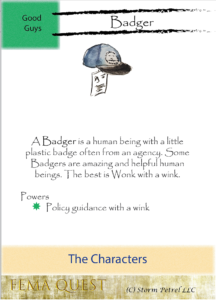
Who the heck is a Badger? A Badger is a human being with a little plastic badge often from the State or from FEMA. Some Badgers are amazing and helpful human beings. The best Wonk with a wink. A great Badger tell you how to work through a grant management or procurement problem with grace. Like a Warrior and a Wonk they’ve seen similar problems. They know what will cause the back-of-house people to get entirely fussed up.
I almost called this character FEMA Bob in honor of my own FEMA Bob. He sat in my office and said: Show me this. I pull out a pile of pictures and document. He’d pick a few and say: Never show these to me, ever. This Badger always showed and proved to me that he was my advocate. He is fair. He is honest. And he is experienced. This is the Badger to know.
We are providing you a Good Guy identification guide. This serves as reminder to find people to help. Click the links below to download this guide
The Scribner
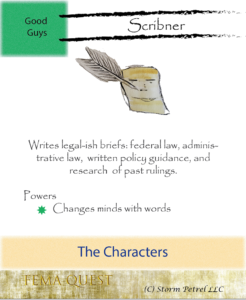
A Scribner is not a Wonk, but some Wonks are also Scribners. You may get into a situation where the rules support your actions and position but FEMA or your State entirely disagree with you. While a Wonk can guide you through the nest of rules, a Scribner can write the email, letters, appeals, and other documents that un-mess stuff.
There is a formula for writing policy stuff. You start with the federal law, work up through administrative law, draw on written policy guidance, and research past rulings from FEMA. It is, in so many ways, a legal brief – except we never admit that. And we never actually call it that.
And we try not to have lawyers sign them. If you Scribner happens to have a Juris Doctorate, leave it off, or have someone in authority at the organization sign the document that was ghost written by the Scribner.
The quality of the writing and the depth of the research informs the recipient that the Scribner knows this material well. FEMA may own the court room, sit as judge, and prosecutor, and jury, and, oddly, it also serves as its own appellate service. When it comes down to it, FEMA must exercise professional discretion based firmly on the law, its own law.
Recruit Allies and Teammates
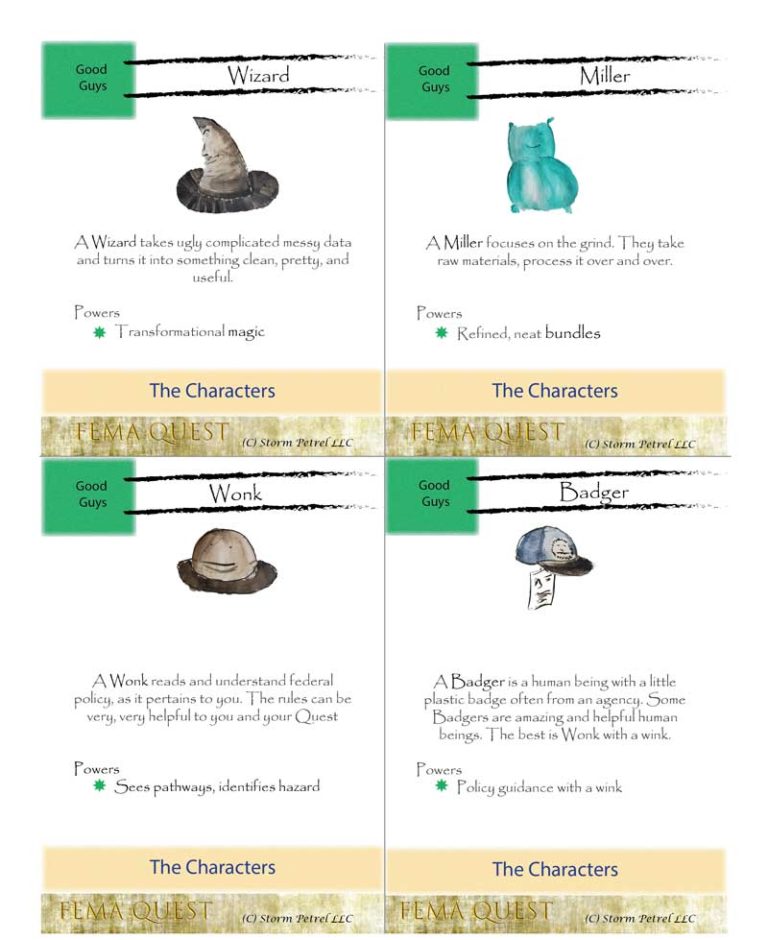
Most of the time, should not try wend your way through FEMA Quest alone. Recruit allies and teammates to help with the grant management basics. Find yourself a Wizard to help turn numbers into information; a Miller who grinds away daily during raw materials into neat, useful packages; Get to know a Wonk – keep informed on the policies and regulations. Your Wonk may also be a Badger. Badgers, people with small plastic badges, can be very helpful and sometimes very not-helpful.

Please share this material with colleagues. Post about us and our efforts on your favorite social media platform. And don’t forget to grab the Good Guy Identification Guide to help you get started with FEMA Quest.
Good Guy Identification Guide